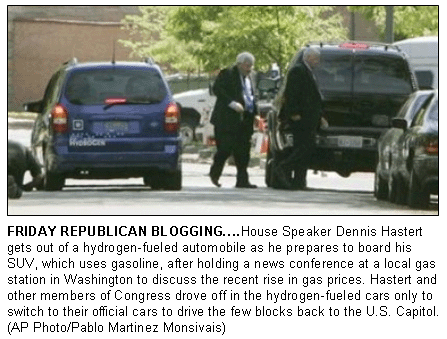Saturday, April 29, 2006
Wednesday, April 26, 2006
Time For The Administration To Sober Up
Zbigniew Brzezinski admonishes the administration on Iran at the International Herald Tribune.
But there are four compelling reasons against a preventive air attack on Iranian nuclear facilities:
1. In the absence of an imminent threat (with the Iranians at least several years away from having a nuclear arsenal), the attack would be a unilateral act of war.
If undertaken without formal Congressional declaration, it would be unconstitutional and merit the impeachment of the president. Similarly, if undertaken without the sanction of the UN Security Council either alone by the United States or in complicity with Israel, it would stamp the perpetrator(s) as an international outlaw(s).
2. Likely Iranian reactions would significantly compound ongoing U.S. difficulties in Iraq and in Afghanistan, perhaps precipitate new violence by Hezbollah in Lebanon, and in all probability cause the United States to become bogged down in regional violence for a decade or more to come. Iran is a country of some 70 million people and a conflict with it would make the misadventure in Iraq look trivial.
3. Oil prices would climb steeply, especially if the Iranians cut their production and seek to disrupt the flow of oil from the nearby Saudi oil fields. The world economy would be severely impacted, with America blamed for it. Note that oil prices have already shot above $70 per barrel, in part because of fears of a U.S./Iran clash.
4. America would become an even more likely target of terrorism, with much of the world concluding that America's support for Israel is itself a major cause of the rise in terrorism. America would become more isolated and thus more vulnerable while prospects for an eventual regional accommodation between Israel and its neighbors would be ever more remote.
It follows that an attack on Iran would be an act of political folly, setting in motion a progressive upheaval in world affairs. With America increasingly the object of widespread hostility, the era of American preponderance could come to a premature end.
snip
It is therefore time for the administration to sober up, to think strategically, with a historic perspective and with America's national interest primarily in mind. Deterrence has worked in U.S.-Soviet relations, in U.S.-Chinese relations, and in Indo-Pakistani relations.
Saturday, April 22, 2006
The Active/Negative President
 Click to enlarge.
Click to enlarge.John Dean has an interesting post at Common Dreams. He takes a look at the study by political scientist James Dave Barber who categorized presidents as active or passive and as positive or negative.
From these measurements, Barber developed four repeating categories into which he was able to place all presidents: those like FDR who actively pursued their work and had positive feelings about their efforts (active/positives); those like Nixon who actively pursued the job but had negative feelings about it (active/negatives); those like Reagan who were passive about the job but enjoyed it (passive/positives); and, finally, those who followed the pattern of Thomas Jefferson -- who both was passive and did not enjoy the work (passive/negatives).
Interestingly, the category of presidents who proved troublesome under Barber's analysis is that of those who turned out to be active/negatives. Barber placed Woodrow Wilson, Herbert Hoover, Lyndon Johnson and Richard Nixon in this class.
In my prior column, I found that the evidence is overwhelming that George W. Bush is another active/negative president, and the past two years, since making that initial finding, have only further confirmed my conclusion.
Because active/negative presidencies do not end well, it is instructive to look at where Bush's may be heading.
Bush's 'Active/Negative' Presidency
Recent events provide an especially good illustration of Bush's fateful - perhaps fatal - approach. Six generals who have served under Secretary of Defense Rumsfeld have called for his resignation - making a strong substantive case as to why he should resign. And they are not alone: Editorialists have also persuasively attacked Rumsfeld on the merits.
Yet Bush's defense of Rumsfeld was entirely substance-free. Bush simply told reporters in the Rose Garden that Rumsfeld would stay because 'I'm the decider and I decide what's best.' He sounded much like a parent telling children how things would be: 'I'm the Daddy, that's why.'
This, indeed, is how Bush sees the presidency, and it is a point of view that will cause him trouble.
Bush has never understood what presidential scholar Richard Neustadt discovered many years ago: In a democracy, the only real power the presidency commands is the power to persuade. Presidents have their bully pulpit, and the full attention of the news media, 24/7. In addition, they are given the benefit of the doubt when they go to the American people to ask for their support. But as effective as this power can be, it can be equally devastating when it languishes unused - or when a president pretends not to need to use it, as Bush has done.
Apparently, Bush does not realize that to lead he must continually renew his approval with the public. He is not, as he thinks, the decider. The public is the decider.
Hat tip to Stuart Eugene Thiel at Pollkatz for the background graphic.
Wednesday, April 19, 2006
Sunday, April 16, 2006
Arrogance and Recklessness
From The Nation:
What we are witnessing is the impact of the arrogance and recklessness not just of Rumsfeld – but the entire Bush administration. As Gen. Newbold wrote, the decision to invade 'was done with a casualness and swagger that are the special province of those who have never had to execute these missions -- or bury the results.'
Amen.
Saturday, April 15, 2006
Thursday, April 13, 2006
Reverend William Sloan Coffin
Read Katrina Vanden Heuvel's tribute in The Nation.
"Clearly the trick in life is to die young as late as possible."
- Reverend William Sloane Coffin From his last book, Credo.
Fire Rumsfeld - The Emerging Pattern
From The Guardian, a former US general in Iraq calls for Rumsfeld to go.
A fourth former US army general in less than a month today called on the US defence secretary, Donald Rumsfeld, to resign over his handling of the war in Iraq.
Retired Major General John Batiste - who commanded the US 1st Infantry Division in Iraq from 2004 until last year - criticised Mr Rumsfeld's authoritarian style and called for a 'fresh start' at the top of the Pentagon.
'We need leadership up there that respects the military as they expect the military to respect them. And that leadership needs to understand teamwork,' Maj Gen Batiste said.
He told CNN he believed the Bush administration's handling of the war had violated fundamental military principles such as unity of command and unity of effort.
He said negative feelings among US generals he served with were widespread, and there was almost universal belief that Mr Rumsfeld did not treat military leaders and their opinions with respect.
The Washington Post reported that the retired soldier had been offered a promotion to three-star rank to return to Iraq, and would have become the second most senior US officer in the country.
He declined because he no longer wanted to work under Mr Rumsfeld.
His comments followed similar attacks by three other retired generals who either served in Iraq or the Middle East.
Wednesday, April 12, 2006
Charlie Cook on The Mute Button
Charlie Cook at the National Journal says "they just stop listening."
There comes a point for some unfortunate presidents when the American people begin to hit the mute button; they just stop listening. Or to put it differently, when the public turns strongly against an elected official on an issue, they begin to turn on that official on everything. In this case, Iraq has become a ball and chain for President Bush, weighing him down on every issue. The separation between his weakest issue, Iraq, and his strongest, terrorism, is just five points.
Hat tip to Laura Rosen at War and Peace.
Monday, April 10, 2006
Friday, April 07, 2006
Crashing The Gate
Here is Bill McKibben reviewing Crashing The Gate at The New York Review of Books.
In its account of the political possibilities of the Internet, Crashing the Gate seems to me the most ambitious, interesting, and hopeful venture in progressive politics in decades.
Thursday, April 06, 2006
The Marianas, Sweatshops and Tom Delay
Molly Ivins highlights Delay's sickening promotion of sweatshops.
The Northern Marianas Islands are a U.S. protectorate (so it can label goods 'Made in the USA') in the Pacific being used as a sort of labor gulag, with workers imported from China and elsewhere and paid pitiful wages. Jack Abramoff had a contract with the government of the Marianas to lobby against stopping the flow of immigrant labor to the islands and to prevent a minimum wage bill (mandating a level higher than the island's standard $3.05 per hour) from getting to the floor of the House.
The islands are home to classic sweatshops. In 1996 and 1997, Abramoff billed the Marianas for 187 contacts with DeLay's office, including 16 meetings with DeLay. In December 1997, DeLay, his wife and their daughter went on an Abramoff-arranged jaunt to the Marianas. DeLay brunched with the Marianas' largest private employer, textile magnate Willie Tan.
Tan had to settle a U.S. Labor Department lawsuit alleging workplace violations. According to the book 'The Hammer' by Lou Dubose and Jan Reid, among the violations common on the islands is forbidding women to work when they are pregnant, thus leading to a high abortion rate.
Evidently, DeLay didn't have time to look into such allegations, since he was busy playing golf and attending a dinner in his honor, sponsored by Tan's holding company. According to The Washington Post, it was at this dinner that DeLay called Abramoff 'one of my closest and dearest friends.' He also reminded those present of his promise that no minimum wage or immigration legislation affecting the Marianas would be passed.
'Stand firm,' he added. 'Resist evil. Remember that all truth and blessings emanate from our Creator.' He then went with Tan to see a cockfight.
This is why DeLay's professions of Christianity make me sick. He was there. He could have talked to the workers. Instead, he chose to walk with the powerful and do real harm to the very people Jesus mandated we especially care for.
Wednesday, April 05, 2006
Exit With Honor
Read Juan Cole's post at Informed Content on getting out of Iraq.
The US needs to get out. Its troops are a constant provocation of the local population, stirring insurgency rather than quieting it. They have never developed the kind of local intelligence or even language skills that would allow them to do real counter-insurgency. When hot civil war nearly erupted in February, US troops could not intervene between Sunnis and Shiites anyway, without becoming a party to it. So what good are they in such a crisis? Better to get them out of harm's way. Moreover, the Bush administration is both incompetent and corrupt, and therefore cannot hope actually to accomplish anything good in Iraq. The longer the US is there virtually unilaterally, the worse the final crash and burn is going to be. But the US has a responsibility, having thrown Iraq into civil war, to make the best arrangements it can for the aftermath.
The six neighbors have the highest stakes in Iraq-- Saudi Arabia, Kuwait, Jordan, Syria, Turkey and Iran. They should immediately be called to a 6 3 meeting with the United States, Britain and the Arab League to begin the work of constituting a post-US multinational force that might hope to keep ethnic and religious militias from marching against one another in the thousands and killing milions.
Exit is easy. Exit with honor will be the hardest thing the United States of America has ever done in its over two centuries of history. Exit without honor will endanger the security of the United States for decades.
Tuesday, April 04, 2006
To Become an American
Fareed Zakaria nails immigration in this post.
Many Americans have become enamored of the European approach to immigration -- perhaps without realizing it. Guest workers, penalties, sanctions and deportation are all a part of Europe's mode of dealing with immigrants. The results of this approach have been on display recently in France, where rioting migrant youths again burned cars last week. Across Europe one sees disaffected, alienated immigrants, ripe for radicalism. The immigrant communities deserve their fair share of blame for this, but there's a cycle at work. European societies exclude the immigrants, who become alienated and reject their societies.
One puzzle about post-Sept. 11 America is that it has not had a subsequent terror attack -- not even a small backpack bomb in a movie theater -- while there have been dozens in Europe. My own explanation is that American immigrant communities, even Arab and Muslim ones, are not very radicalized. (Even if such an attack does take place, the fact that 4 1/2 years have gone by without one provides some proof of this contention.) Compared with every other country in the world, America does immigration superbly. Do we really want to junk that for the French approach?
 Click to enlarge.
Click to enlarge. Click to enlarge.
Click to enlarge. Click to enlarge.
Click to enlarge. Click to enlarge.
Click to enlarge. Click to enlarge.
Click to enlarge. Click to enlarge
Click to enlarge Click to enlarge.
Click to enlarge.


